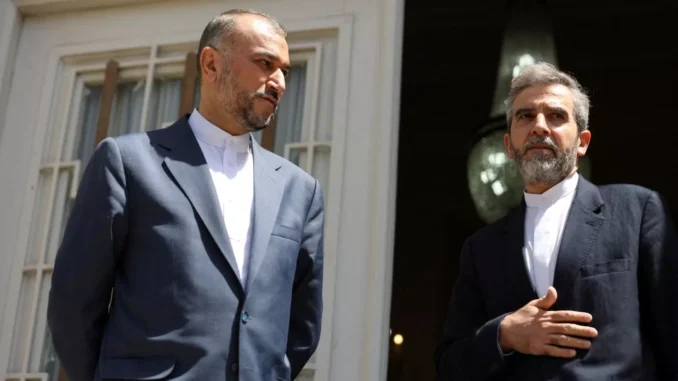E. Rowell: If there weren’t enough reasons before now, this is yet one more good reason for Netanyahu to turn down ANY “deal” from the Biden Administration.
Sources close to the discussions in Oman tell MEE that the delegations spoke about ending Israel’s war and a shared desire for a change in Israeli government
By MEE Correspondent in Tehran, MIDDLE EAST EYE 21 May 2024
 Iran’s late foreign minister Hossein Amir-Abdollahian speaks with chief nuclear negotiator Ali Bagheri Kani in Tehran, 23 June 2022 (Reuters/Majid Asgaripour/WANA)
Iran’s late foreign minister Hossein Amir-Abdollahian speaks with chief nuclear negotiator Ali Bagheri Kani in Tehran, 23 June 2022 (Reuters/Majid Asgaripour/WANA)
Secret talks between Iran and the United States in Oman were making good progress, but have now been jeopardised by the sudden death of Iranian President Ebrahim Raisi and his foreign minister.
Brett McGurk, US President Joe Biden’s senior Middle East adviser, held indirect negotiations earlier this month with Ali Bagheri Kani, Iran’s point man for negotiations with the West, according to three Iranian sources close to the talks.
The talks took place in Muscat, which hosted secret meetings between Tehran and Washington a decade ago that led to the 2015 JCPOA (joint comprehensive plan of action) nuclear agreement.
They were the first round of discussions between the US and Iran since January.
One source close to the talks, which were first reported by Axios on Friday, told Middle East Eye that discussions between Bagheri Kani and McGurk were progressing well and were close to reaching some sort of agreement.
Bagheri Kani was deputy foreign minister at the time, but following the death of Hossein Amir-Abdollahian in the helicopter crash that killed Raisi on Sunday, he is now acting foreign minister.
The talks focused on three subjects: a shared desire for a change in government in Israel; ending Israel’s war on Gaza; and preventing the conflict from spreading elsewhere in the region.
An analyst close to the Iranian ruling establishment suggested to MEE that the talks also seem to have served as a way of establishing a ceasefire between the US on one side and Iran and its allies on the other.
Since the 7 October Hamas-led attack on Israel and subsequent war on Gaza, Iranian allies such as Yemen’s Houthi movement, officially known as Ansar Allah, and Iraqi paramilitaries have staged attacks on US targets in the region.
Iranian drones and missiles were also shot down by US forces in April, when Iran staged a massive attack on Israel in response to the killing of Republican Guard commanders in Iran’s consulate in Damascus.
The analyst believes there may have also been discussions on Iran’s nuclear programme and easing oil sanctions.
The JCPOA, in which Iran curbed its nuclear development programme in return for sanctions relief, collapsed after the Trump administration unilaterally withdrew the United States from it in 2018.
However, last year, Washington and Tehran reached a prisoner exchange deal that included the US handing over $6bn in confiscated oil revenues.
The talks leading up to that agreement in August also proposed curbs on Iran’s nuclear programme, suggesting there was room for more focused deals to be made, rather than the more expansive JCPOA.
No talks till after elections
Before the Muscat talks began, McGurk met with Iran’s envoy to the United Nations, Saeid Iravani, according to the sources.
In the meeting, one source said, McGurk quoted Biden as saying: “I will not negotiate with Iran for a nuclear and comprehensive deal until after the US election because the Iranians cannot keep their promises.”
McGurk said Biden had complained he faced “too much pressure and humiliation” from Republicans when Raisi’s government refused to revive the JCPOA in 2022 after Donald Trump was voted out.
Biden was quoted as saying: “In my opinion, the JCPOA is dead, and we will negotiate after the elections, provided it is a comprehensive negotiation that goes beyond the JCPOA, covering regional issues as well.”
Middle East Eye has asked the US State Department for comment.
Another round of US-Iran talks are not expected soon.
Following Raisi’s death, Iran needs to hold a presidential election within 50 days, and it is unlikely that major foreign policy decisions will be taken during this period of uncertainty. US presidential elections are meanwhile due in November.
“Given this situation, we should expect disruptions and a halt in negotiations with the Americans,” an analyst who previously worked for the ruling establishment told MEE.
“Since both the president and the foreign minister have passed away and an election is due soon, negotiations will likely be delayed until after the election, similar to what happened during the 2021 presidential race when talks were put on hold until after the election.”



1 Comment / 1 Comment